Nov 2022 2nd Edition
Nov 2022 2nd Edition vuyelwan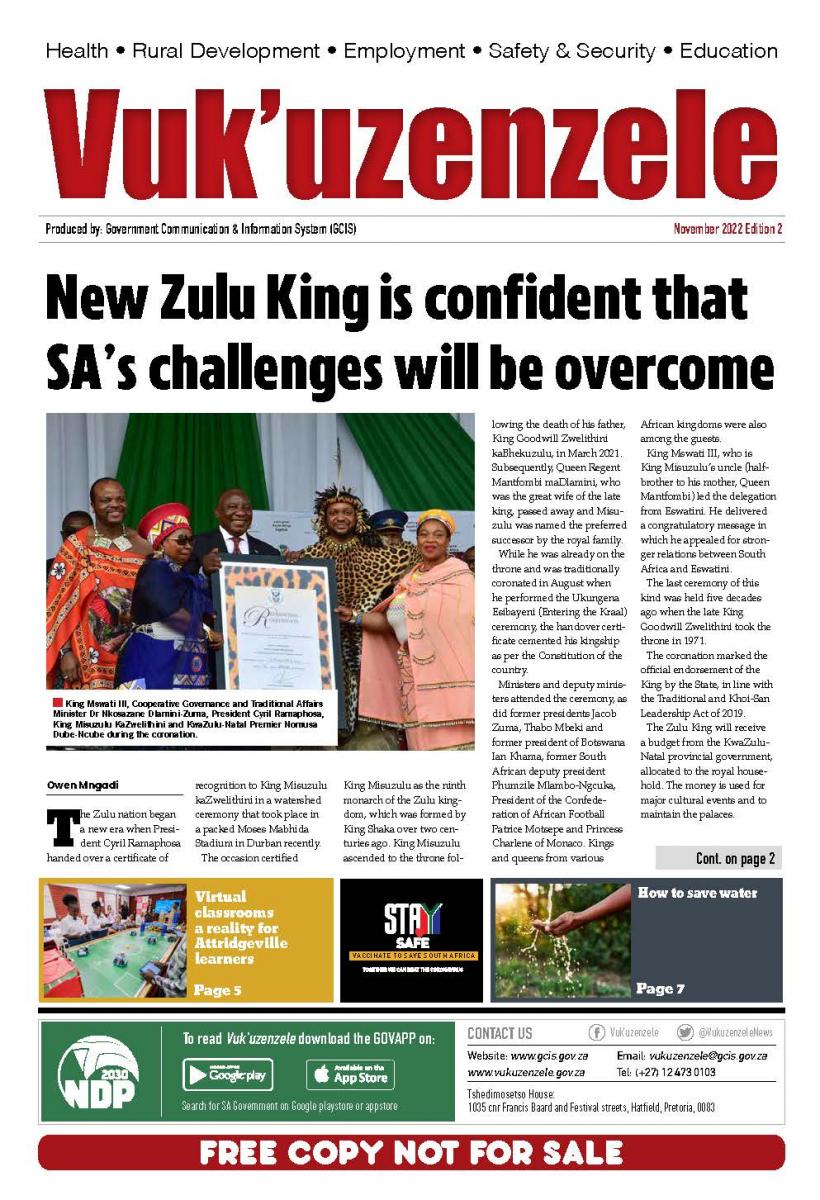
English PPDF version
Translations
Afrikaans
isiNdebele
isiXhosa
isiZulu
Sepedi
Sesotho
Setswana
Siswati
Tshivenda
Xitsonga
Academy teaches young people to spread their wings
Academy teaches young people to spread their wings LondekileSifiso Soyizwapi (23) of Khayelitsha in the Western Cape encourages unemployed youth who are not in education or training in his province to join the Chrysalis Academy so that they can improve their lives and the communities they live in.
The Chrysalis Academy is an initiative of the Western Cape Government (WCG). It was started in 2000.
The academy targets young people aged 18–25 and has so far produced more than 10 000 graduates from communities across the Western Cape.
It runs three courses per year (Alpha, Bravo and Charlie). Two are for men and one is for women. The courses offer a choice of training, ranging from first aid to basic cookery, office administration, security and peace officer work, welding and electrical circuitry. Other focus areas include personal mastery, emotional intelligence, leadership, diversity, inclusion and fitness.
Soyizwapi is currently doing the three-month 22 Bravo empowerment course.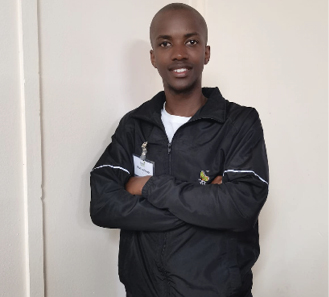
“The course prepares us for employment after graduation and coaches us on how to make a difference in our communities. The academy helps youth to unleash their potential,” he says.
Soyizwapi matriculated in 2018. He learnt about the academy from a friend who was able to get a job after receiving training from the academy.
“I decided to join the academy because I was seeking a better future for myself,” says Soyizwapi.
Western Cape MEC for Police Oversight and Community Safety Reagen Allen says the Chrysalis Academy continues to make a significant difference in the lives of young people. “Upon the successful completion of the course, the young people can look forward to a 12-month paid career opportunity, which will commence immediately after their graduation,” he says.
The graduates are placed at municipalities, clinics, libraries and South African Police Service stations, among other institutions.
Who can apply?
To apply, you must be a Western Cape resident between the ages of 18 and 25. You must have passed Grade 9, must not have a criminal record nor already be in employment, education or training.
Alpha 23 (women) applications opened on 1 October and close on 30 November 2022. Bravo (men) applications open on 1 February 2023 and close on 31 March 2023. Charlie (men) applications open on 1 June 2023 and close on 31 July 2023.
Applications for the 2023/24 financial year can be submitted online through the website www.chrysalisacademy.org.za
Apply now for a DMRE bursary
Apply now for a DMRE bursary LondekileMatrics and youth who have already obtained their matric certificate are urged to apply for a bursary from the Department of Mineral Resources and Energy (DMRE) for their 2023 studies.
The DMRE is facilitating full-time bursaries for eligible South African scholars from disadvantaged social backgrounds, who are currently doing or have completed grade 12.
Applicants should be studying in the mining and energy-related fields, preferably in the following disciplines:
- Bachelor of Science (Physics and Chemistry)
- Chemical Engineering (Mineral Processing)
- Electrical Engineering (Heavy Current)
- Electro-Mechanical Engineering
- Environmental Health and Management
- Geology
- Industrial Engineering
- Mechanical Engineering
- Metallurgical Engineering (Extractive)
- Mining Engineering
- Mining Survey
- Nuclear Engineering
- Rock Engineering.
Who can apply?
- South African citizens in matric, or who have completed matric.
- Preference will be given to women and people with disabilities.
- You must be studying or intend to study at a university or university of technology in South Africa.
- You must have achieved a minimum level 6 or higher grade ‘B’ for science in matric.
- You must have achieved a minimum level 6 or higher grade ‘B’ for mathematics in matric.
- You must be in financial need.
- You must be unemployed.
Various documents must be submitted with your application, including:
- Certified copy of National Senior Certificate or latest Grade 12 results.
- Certified copy of latest academic transcript.
- Printed proof of registration or acceptance letter from the tertiary education institution.
- Students currently in matric must send their final matric results and final acceptance letter within the first week of the release of matric results.
- Certified copy of identity document.
- Certified copy of proof of residence (not older than three months).
How to apply?
To download the application form, visit www.zabursaries.co.za/wp-content/uploads/2022/10/DMRE-Bursary-Applicati…
Applications close on 30 November. If you are not contacted before 31 January 2023, consider your application unsuccessful.
Applications can be submitted via email to girllearnerbursary@dmre.gov.za; delivered to Nondumiso Zulu, DMRE Trevenna Campus, 70 Meintjies Street, Sunnyside; or posted to Private Bag X59, Arcadia, 007.
Information supplied by the DMRE.
For more information, contact Morongwe Madisha at 012 444 3860 or Olga Sedibe at 012 444 3309.
Community radio stations benefit from MDDA
Community radio stations benefit from MDDA UrsulaThe community of Ngcobo in the Chris Hani District of the Eastern Cape finally has its own community radio station that serves as an information platform and adds value to residents’ lives. 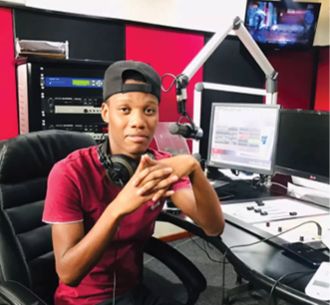
Engcobo FM 96.6 MHz recently received state-of-the-art broadcast studios from the Minister in the Presidency, Mondli Gungubele. The studios were sponsored by the Media Development and Diversity Agency (MDDA).
Speaking at the launch, Minister Gungubele said the residents of Ngcobo will now be able to consume news from their own locality, in the language of their choice and about people they know.
“If people believe in their communities, they are able to work together, develop themselves and be prosperous. To do all of this, they need information and Engcobo FM is the source that can release this positive energy needed to lift Ngcobo to greater heights,” said the Minister.
According to Station Manager Lusindiso Tantsi, the radio station will not only benefit Ngcobo, but exists to link all the Chris Hani District communities.
“This radio station was started by a community group in 2017, but could not take it any further [due to various challenges]. They then approached me to assist them with getting a licence from the Independent Communications Authority of South Africa and to set the business up, and I was happy to be involved,” says Tantsi.
After numerous delays, the radio station finally went on air officially in July 2022. It broadcasts 95% in isiXhosa and 5% in English.
Because the station is still new, Tantsi says the Broadcast Research Council of South Africa, which does research into radio stations’ listenership, has not yet included Engcobo FM in the radio audience measurement survey. However, the community radio station caters for listeners of all ages and has already gained over 8 000 followers on Facebook.
“We have 18 employees at the station so far. Our radio station is run professionally and will ensure that our clients from the private sector and government receive the best service,” he says.
The MDDA also unveiled new studios at the Barberton Community Radio 104.1 in Mpumalanga, Aganang FM 90.0 in Potchefstroom in the North West, and Kasie FM 97.1 in Katlehong in Gauteng.
For more information about MDDA, visit www.mdda.org.za or WhatsApp 063 509 4934, Facebook: MDDA, Twitter: @MDDA_Media, or Instagram: @MDDA_Media
Early childhood development holds the key to our future
Early childhood development holds the key to our future vuyelwanFrom The Union Buildings
There are few presidential activities more fulfilling than spending a morning in the company of small children. I recently attended the opening of the Little Flower early childhood development (ECD) centre in Bizana in the Eastern Cape, where I got to spend time with some of the future leaders of our country, reading to them and listening to them.
The centre was recently built by the development organisation Impande South Africa through the support of the Nelson Mandela Foundation.
I was deeply touched by the dedication of the centre’s staff to supporting the community and its children. They told me how in the centre’s earliest days, staff struggled to get paid and yet still came to work. They also told me that even if families are not able to pay the R20 fee for their child, the children are not turned away.

The commitment of the ECD centre staff is so important because early childhood development centres play a pivotal role in our nation’s development. These centres can be found in every village, town and city in the country. Most were started by women in the community to support parents who need their children to be cared for when they are at work. Many of these centres began as creches and day-care facilities. Many have subsequently grown and expanded to incorporate a basic learning curriculum into their services.
As government, we have taken up the task to improve the standards of care and make resources available for ECD centres to run suitable activities for young children to prepare them for formal education. In April 2022, we completed the move of the ECD function from the Department of Social Development to the Department of Basic Education. This is to link early childhood development to the formal school curriculum and to provide training, education and development to staff in ECD centres around the country.
Because this foundational learning is key to a child’s success in later years, the Basic Education Laws Amendment Bill that is currently before Parliament proposes that it be compulsory for all children to receive two years of ECD before they enter Grade 1. It is at this stage that children should be taught, learn through play and receive at least one meal a day.
Early childhood development centres don’t just prepare our country’s youngest citizens to succeed in school; they are also an important source of entrepreneurship and job creation. These centres are an important part of the care economy. They sustain livelihoods, especially for women, which contributes to job creation in many communities.
When the COVID-19 pandemic struck, ECD centres were hard hit. Facilities that rely on school fees to keep running were unable to pay their staff and many parents who lost their jobs were unable to keep their children enrolled.
In response, government established the ECD Employment Stimulus Relief Fund to help ECD centres that had lost income as a result of the pandemic and to enable them to recover.
Preparing our youngest citizens with the tools they need to succeed in life is a responsibility we must collectively shoulder. We must continue to do all we can, as government, the private sector and development organisations, to support early childhood development.
With the many valuable services it provides, whether it is educating our children, providing childcare for working parents or creating opportunities for entrepreneurs, ECD makes a huge contribution to the achievement of many of our developmental goals.
Since the care economy is mainly driven by women, such support goes a long way towards helping women, especially in disadvantaged communities, to become financially secure and independent.
The young children in these centres are the next generation of South Africans who must be able to live up to their full potential as responsible, capable and outstanding citizens.
They must be able to pursue their dreams so that we all may achieve our shared dream of a free, prosperous and happy nation.
How to save water
How to save water UrsulaThe reliability of water supply by municipalities to households across South Africa is only at 68%, despite the strides made by the Department of Water and Sanitation to eradicate water supply backlogs over the years. 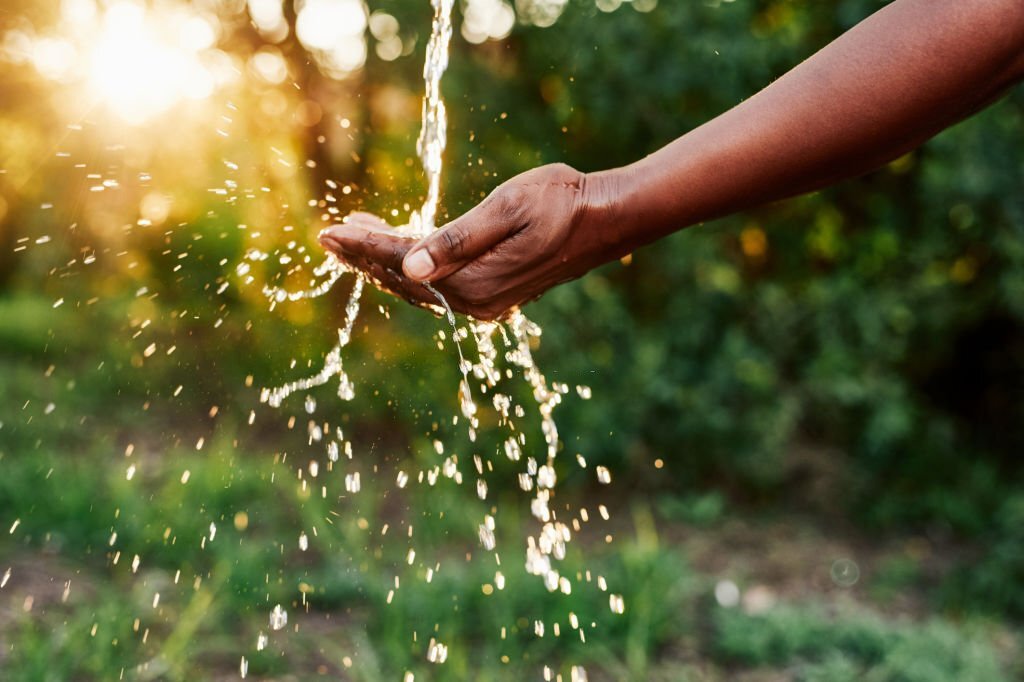
Water and Sanitation Deputy Minister David Mahlobo says this is due to old infrastructure, lack of operation and maintenance on water schemes, and the poor integration between housing programmes and current infrastructure development projects.
“It is a major concern that the provision of reliable supply water is showing signs of decline,” he says.
As a water scarce country, South Africa ranks among 30 driest countries in the world. Most of the country’s water comes from rainfall, but with the recorded average rainfall that is 40% less than the annual world average, the country is often affected by drought.
However, the department has water saving tips for you.
Saving water in your home or business
- Turn the tap off between washing your face, brushing your teeth or shaving.
- Taking a five-minute shower a day instead of a bath will use a third of the water used bathing in a bath tub, saving up to 400 litres a week.
- Showering can use up to 20 litres of water per minute, whereas taking a bath can use between 80 and 150 litres of water per bath. If you prefer to bath, do not fill up the bathtub.
- Avoid flushing the toilet unnecessarily. Dispose of tissues, insects and other waste in the trash rather than the toilet. Every time you flush the toilet, 12 litres of water is used.
- Fix a leaking toilet otherwise it can waste up to 100 000 litres of water in one year.
- Use “grey water” — used water from baths, washing machines and other safe sources to flush your toilet.
- Do not overfill or excessively backwash your swimming pool.
- Kettles should not be filled to the brim but with just enough water for your needs. This will reduce your electricity bill too.
- Use a bucket rather than a hose to wash your car. If you have to use a hose, use a sprayer that can be turned off in-between spraying the car. Using a garden hose could use as much as 30 litres of water per minute.
- Farmers must ensure that they keep toxic insecticides away from water sources and streams.
- People living in rural areas should be careful not to use the river or riverbank as a toilet.
In the garden
- Always water your plants during the early morning hours or in the evening, when temperatures are cooler.
- Every time you boil an egg, save the cooled water for your houseplants. They will benefit from the nutrients released from the shell.
- Roof water can also be profitably stored in tanks, for watering gardens.
- Use “grey water”-- used water from baths, washing machines and other safe sources-- to water your garden.
For more information, visit www.dws.gov.za
Translations
Afrikaans
isiNdebele
isiXhosa
isiZulu
Sepedi
Sesotho
Setswana
Siswati
Tshivenda
Xitsonga
Letters to the Editor
Letters to the Editor vuyelwan
New Zulu King is confident that SA’s challenges will be overcome
New Zulu King is confident that SA’s challenges will be overcome vuyelwanThe Zulu nation began a new era when President Cyril Ramaphosa handed over a certificate of recognition to King Misuzulu kaZwelithini in a watershed ceremony that took place in a packed Moses Mabhida Stadium in Durban recently.
The occasion certified King Misuzulu as the ninth monarch of the Zulu kingdom, which was formed by King Shaka over two centuries ago. King Misuzulu ascended to the throne following the death of his father, King Goodwill Zwelithini kaBhekuzulu, in March 2021. Subsequently, Queen Regent Mantfombi maDlamini, who was the great wife of the late king, passed away and Misuzulu was named the preferred successor by the royal family. 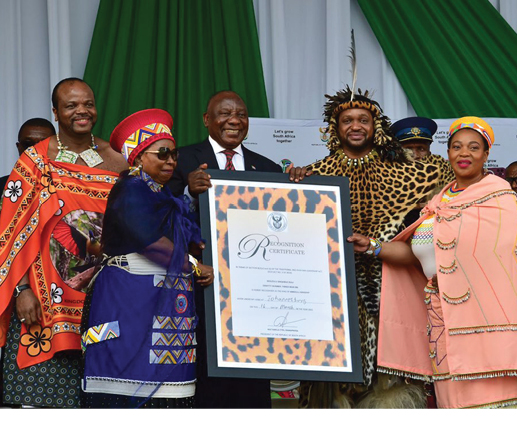
While he was already on the throne and was traditionally coronated in August when he performed the Ukungena Esibayeni (Entering the Kraal) ceremony, the handover certificate cemented his kingship as per the Constitution of the country.
Ministers and deputy ministers attended the ceremony, as did former presidents Jacob Zuma, Thabo Mbeki and former president of Botswana Ian Khama, former South African deputy president Phumzile Mlambo-Ngcuka, President of the Confederation of African Football Patrice Motsepe and Princess Charlene of Monaco. Kings and queens from various African kingdoms were also among the guests.
King Mswati III, who is King Misuzulu’s uncle (half-brother to his mother, Queen Mantfombi) led the delegation from Eswatini. He delivered a congratulatory message in which he appealed for stronger relations between South Africa and Eswatini.
The last ceremony of this kind was held five decades ago when the late King Goodwill Zwelithini took the throne in 1971.
The coronation marked the official endorsement of the King by the State, in line with the Traditional and Khoi-San Leadership Act of 2019.
The Zulu King will receive a budget from the KwaZulu-Natal provincial government, allocated to the royal household. The money is used for major cultural events and to maintain the palaces.
Developing rural areas
President Ramaphosa committed his government to work with the King to change people’s lives and transform rural areas into places of development and prosperity. He says traditional leaders are custodians of the cultures, customs and traditions that make us who we are.
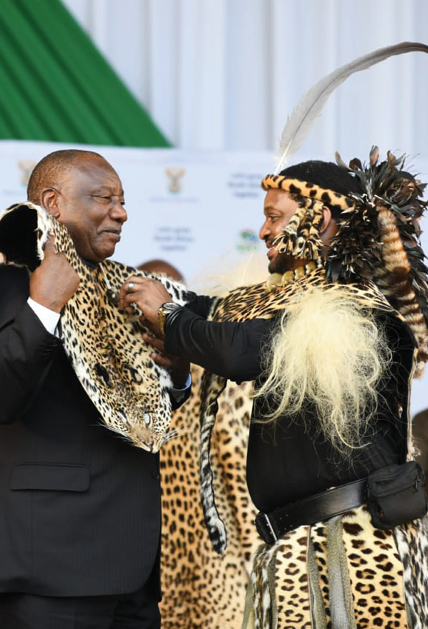 “You are the latest in a long line of great kings, who have seen many challenges across the centuries, and today we are also faced with many difficulties. Millions of our people are unemployed and live in poverty. Substance abuse, crime and the abuse of women, children and the elderly are devastating our communities. Many of our rural areas suffer from poor services and a lack of jobs. Land reform remains a huge problem.
“You are the latest in a long line of great kings, who have seen many challenges across the centuries, and today we are also faced with many difficulties. Millions of our people are unemployed and live in poverty. Substance abuse, crime and the abuse of women, children and the elderly are devastating our communities. Many of our rural areas suffer from poor services and a lack of jobs. Land reform remains a huge problem.
“As government at the local, provincial and national level, we continue to make several interventions to address all these challenges and will want to rely on you, Your Majesty, to work with us to address the problems that our people are facing on a daily basis.”
As King Misuzulu took to the podium, the crowd cheered. He told his subjects and guests that he took over the throne when the country was facing challenges such as unemployment, poverty, and trust deficits in the government, and he vowed to work with all stakeholders to overcome the challenges.
“It is my daily prayer that I will be the catalyst for development and change. Our history is incomplete without other races of Indians, English, Afrikaners, and other Nguni tribes. I am devoted to promoting peace and reconciliation as my father (King Zwelithini) had already started. I have full confidence in our government that we will overcome the challenges if we work together,” he said.
Witnessing the King’s coronation
About 45 000 people, mainly Zulu regiments (amabutho) and maidens clad in their traditional attire, took turns to salute the King in front of the stage. They spoke with pride of how privileged they were to be part of what they hoped would be a once-in-a-lifetime ceremony.
“It is an amazing feeling to be in full traditional gear, as we normally wear suits. The atmosphere is overwhelming… I’m truly proud of being a Zulu and seeing other nations coming to celebrate with us,” said Zibonele Mncwango from Pietermaritzburg. 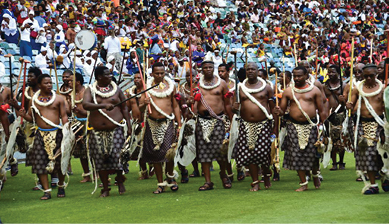
Dolly Masango, Commander of Maidens, led thousands of maidens who came from various areas of KwaZulu-Natal. She said the maidens, like regiments, are special to the King as they are by his side, wherever he goes.
“We are happy that the succession process is finally over and the King can continue with programmes where we play our roles as maidens,” she said.
A pensioner, Mbhekiseni Mpaza, said he was lucky to have witnessed the coronation. “It is encouraging to see many young people being part of this; it shows that the Zulu culture will be preserved for future generations,” he said.
Opportunities for creative practitioners
Opportunities for creative practitioners UrsulaIf you own a performing arts organisation, a production house or you are an independent producer in the arts industry, the Artscape Theatre Centre invites you to submit proposals for innovative, stage-ready dramas, music, dance or cross-genre productions to be staged in 2023. 
Artscape Theatre Centre is an agency of the Department of Sport, Arts and Culture. It coordinates efforts aimed at providing much-needed support and resources for creative practitioners. The centre is a creative hub that distributes industry-related information to creative practitioners.
It also allows creative practitioners an opportunity to network among themselves and it offers administrative support through a computer lab, facilities, consultations and capacity building.
Applications close on 30 November 2022. While productions may have open-ended themes, preference will be given to themes that explore:
Heritage and/or cultural diversity that affects the African continent and South Africa and all its people;
Stories from all cultures, especially those in the Western Cape; and productions focusing on women/gender and humanity.
The productions will be considered for the annual Women and Humanity Festival, which takes place in August, and for the Heritage Festival in September.
The centre will partner with the selected productions by providing the use of an Artscape venue for the run of the production, with full technical support, marketing and publicity assistance.
Criteria
To meet the selection criteria, proposals must include:
- Brief synopsis of the production;
- Script, if it’s a drama production;
- Concept narrative – if there is no script, or for dance and workshopped productions;
- Provide full staging and technical specifications;
- Company and creative team information and contact details of the person(s) who will lead the team;
- The applicant(s) must own the rights of the proposed project and provide proof thereof and a comprehensive production budget.
Submit proposals or enquiries to productions@artscape.co.za. In the email subject line, applicants must state the applicable category, either ‘Artscape proposal: Heritage Month’ or ‘Artscape proposal: Women and humanity’. For more information, call 021 410 9800 or email artscape@artscape.co.za
Skincare company thrives thanks to GEP
Skincare company thrives thanks to GEP LondekileInspirational entrepreneur Samane Molwantwa is now exporting her skincare products, thanks to the assistance she received from the Gauteng Enterprise Propeller (GEP).
Molwantwa is the founder and Chief Executive Officer of Krugersdorp-based Ya Sama Body Care, a cosmetics manufacturing business launched in 2020.
When she couldn’t find skincare products suitable for her eczema-prone skin, she decided to make her own.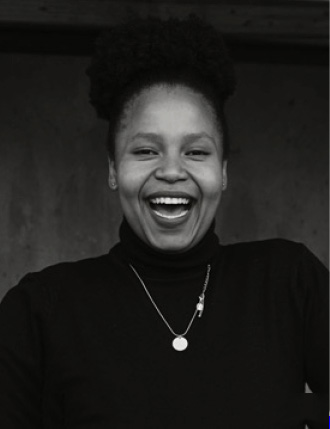
“I launched the company to fulfil my vision of creating a cosmetics range made from natural products, which have been used for centuries for body care,” says Molwantwa.
“Many people have sensitive skin and many others struggle with acne-prone skin. This wasn’t only a business opportunity, it was also an opportunity to make a real difference in people’s lives,” she adds.
She attributes much of her company’s success to the support she has received from the GEP, which provides unique and tailored financial support services to propel small, medium and micro enterprises into the mainstream economy.
“Before I approached the GEP for assistance, my business was almost nowhere. We did not have access to the raw materials we needed to produce our products,” says Molwantwa.
“The GEP helped us to get more raw materials so that we could produce more products. This is how we got to where we are today. Now, we are meeting the demand for our products,” she adds.
The GEP also helped the company to get specialised packaging for its products. “The new packaging is a big improvement on our first packaging and labels, which were not good quality,” she says.
The GEP provides grant funding to small enterprises that do not meet the qualification criteria for loans.
For more information about the GEP and how to get assistance, visit www.gep.co.za/what-we-do/financial-support.
Virtual classrooms a reality for Atteridgeville learners
Virtual classrooms a reality for Atteridgeville learners LondekileOver 14 000 learners are set to benefit from virtual classrooms, that include robotics and coding elements, due to a public-private partnership between the Vodacom Foundation and the Department of Basic Education (DBE).
According to Takalani Netshitenzhe, the Director of External Affairs at Vodacom South Africa, its Virtual Classroom Solution (VCS) was approved by the Independent Communications Authority of South Africa at the height of COVID-19, to enable remote access to teaching and learning in poor communities.
Vodacom aims to roll out 13 virtual classrooms, which will benefit about 14 000 learners.
The VCS was recently launched at Dr WF Nkomo Secondary School in Atteridgeville, Tshwane, to benefit its 1 500 learners.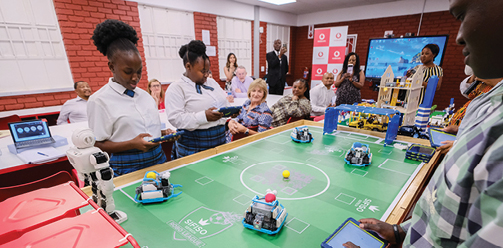
Netshitenzhe says the virtual classroom will help prepare learners for the Fourth Industrial Revolution as it has a fully kitted e-learning end-to-end solution, with internet connectivity across the school.
“The network enables the school to connect to educational broadcasting centres and other schools, to share resources and expertise remotely,” he adds.
Khazamula Chauke, the principal of Dr WF Nkomo Secondary School, says the VCS ensure that the school’s educators and learners are more productive.
“Teachers can now interact with learners, without being physically in the same room… Along with internet connectivity throughout the school and access to e-learning, learners now have their own data-enabled laptops, so they don’t have to rely on what is in the information technology (IT) centre,” he adds.
Netshitenzhe says the laptops also enable learners to access curricula-aligned content and various platforms, such as Microsoft Office 365 Education, 2Enable and Vodacom e-School.
“The children are really excited. They’re also enjoying other benefits of the programme, such as being able to access extra resources by remotely connecting to educational broadcasting centres and other schools. I have no doubt that we will see greater improvement in their learning, productivity and how they perform academically,” says Chauke.
Following the implementation of the programme, Chauke says many learners are now also showing an interest in technology.
“In schools such as ours, subjects like IT haven’t been fully rolled out. This is definitely creating interest in that space, as now learners are more empowered to navigate a digital world. The coding and robotics elements have particularly grabbed their attention, and I’m excited to see where these digital skills will take them,” he adds.
For more information visit https://www.vodacom.com/vodacom-foundation.php
YES initiative gets a nod from the youth
YES initiative gets a nod from the youth UrsulaThe Youth Unemployment Service (YES), a business-led collaboration with the Department of Labour, is creating on-the-job training and job opportunities for the country’s unemployed youth. 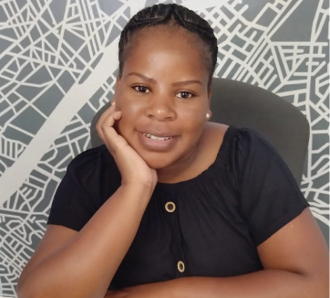
Launched by President Cyril Ramaphosa in March 2018, YES offers 12 months’ qualified working experience to qualifying candidates. Thereafter, they receive a CV and reference letter. This gives them a three times greater chance of getting an interview or being called back for a position.
Remote Metering Solutions (RMS), the largest privately-owned South African utilities management solutions provider, is a partner in the YES initiative.
“RMS provides invaluable work experience to give youth the confidence, life experiences and an understanding of some of the practical requirements of a job,” says Anneri Morland, RMS’ Human Resources, Payroll and Support Team Lead.
RMS joined the initiative in 2019 with 18 learners and continues to host 18 learners annually. Between two and four of them are then appointed to full-time positions.
Mmaphuthego Fridah Moage (28), from Mabopane in Tshwane, was an RMS learner in 2020. She was employed by the company, as a contact centre agent, after her learnership.
Moage says she was unemployed when she heard about the programme and applied.
“I had lost hope in everything, but the programme changed my life. It was a great opportunity to learn and grow within the company.
“I learnt how to respond to customers’ emails, resolve customer complaints, identify and escalate issues to my supervisor and follow up with customers,” she says.
The RMS programme
RMS’ YES learners are placed in one of several teams for the duration of the learnership, namely the call centre, finance, human resources and support, manual meter reading, meter data management, compliance or billing.
Morland says each candidate receives a smartphone from the YES programme, which comes pre-loaded with the YES mobile application. The app provides work readiness modules and a step-by-step guide on how to write a CV.
“In future, we hope to see the initiative evolving to include an appropriately trained recruitment pool of potential employees. This will enable employers to select people who have the appropriate skills developed for RMS’ work context,” says Morland.
How to apply
To qualify for the RMS YES programme, candidates must:
- Be between 18 and 29.
- Be a South African citizen.
- Not have previously registered for a YES learnership.
- Not have previously worked at RMS.
As the RMS programme runs annually, there is no closing date. To apply, send your CV to recruitment@remotemetering.net. For more information about YES, visit https://yes4youth.co.za.
